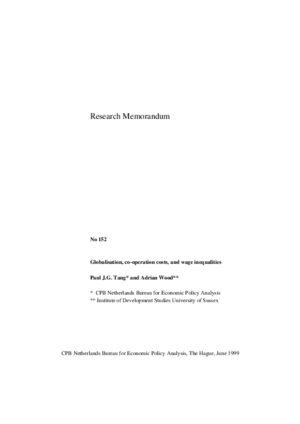June 1, 1999
Globalisation, co-operation costs, and wage inequalities
The plummeting cost of international business travel and communication has enabled high-skilled workers resident in developed countries to become increasingly involved in production in developing countries.
They can co-operate there with less-skilled workers whose wages are lower than those of less-skilled workers in developed countries. Reduction of ‘co-operation costs' thus has a double effect on wage inequalities. It narrows the gap between developed and developing countries in the wages of less-skilled workers, but in most cases widens the wage gap within developed countries between high-skilled and less-skilled workers.
Downloads
English, Pdf, 494.4 KB
Authors
Paul Tang
A. Wood
